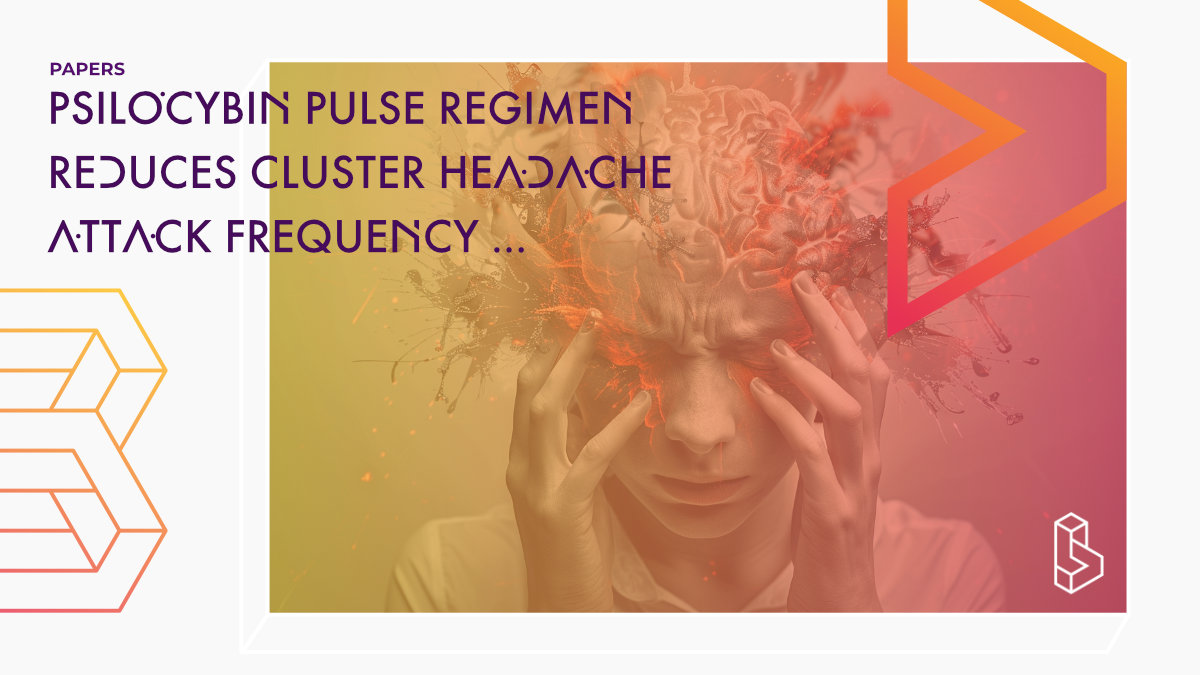This double-blind, placebo-controlled study (n=10) assesses the safety and efficacy of repeated pulse administration of psilocybin (10mg/70kg, 3x in 15 days) in cluster headache patients. Following the initial trial, eligible participants received a psilocybin pulse at least 6 months later and kept headache diaries for 8 weeks. Results indicate a significant reduction in cluster attack frequency following the psilocybin pulse, suggesting potential therapeutic benefits.
Abstract of Psilocybin pulse regimen reduces cluster headache attack frequency in the blinded extension phase of a randomized controlled trial
“Background: In a recent randomized, double-blind, placebo-controlled study, we observed a nonsignificant reduction of attack frequency in cluster headache after pulse administration of psilocybin (10 mg/70 kg, 3 doses, 5 days apart each). We carried out a blinded extension phase to consider the safety and efficacy of repeating the pulse regimen.
Methods: Eligible participants returned to receive a psilocybin pulse at least 6 months after their first round of study participation. Participants kept headache diaries starting two weeks before and continuing through eight weeks after the first drug session. Ten participants completed the extension phase and all ten were included in the final analysis.
Results: In the three weeks after the start of the pulse, cluster attack frequency was significantly reduced from baseline (18.4 [95% confidence interval 8.4 to 28.4] to 9.8 [4.3 to 15.2] attacks/week; p = 0.013, d’ = 0.97). A reduction of approximately 50% was seen regardless of individual response to psilocybin in the first round. Psilocybin was well-tolerated without any unexpected or serious adverse events.
Discussion: This study shows a significant reduction in cluster attack frequency in a repeat round of pulse psilocybin administration and suggests that prior response may not predict the effect of repeated treatment. To gauge the full potential of psilocybin as a viable medicine in cluster headache, future work should investigate the safety and therapeutic efficacy in larger, more representative samples over a longer time period, including repeating the treatment.”
Authors: Emmanuelle A. D. Schindler, R. Andrew Sewell, Christopher H. Gottschalk, L. Taylor Flynn, Yutong Zhu, Brian P. Pittman, Nicholas V. Cozzi & Deepak C. D’Souza
Summary of Psilocybin pulse regimen reduces cluster headache attack frequency in the blinded extension phase of a randomized controlled trial
Introduction
Cluster headache is a rare headache disorder characterized by distinctive autonomic, circadian, and circannual features. Psychedelic compounds, such as psilocybin, lysergic acid diethylamide (LSD), and other indoleamine 5- hydroxytryptamine 2A receptor agonist compounds, may confer therapeutic benefit in cluster headache.
This exploratory study tested the effects and safety of a low dose of psilocybin taken three times, 5 days apart each, on cluster headache. It found that the treatment reduced several measures of cluster headache burden and was safe.
Find this paper
https://doi.org/10.1016/j.jns.2024.122993
Paywall | Google Scholar | Backup | 🕊
Cite this paper (APA)
Schindler, E. A., Sewell, R. A., Gottschalk, C. H., Flynn, L. T., Zhu, Y., Pittman, B. P., ... & D'Souza, D. C. (2024). Psilocybin pulse regimen reduces cluster headache attack frequency in the blinded extension phase of a randomized controlled trial. Journal of the Neurological Sciences, 122993.
Study details
Compounds studied
Psilocybin
Topics studied
Headache Disorders
Study characteristics
Original Re-analysis
Placebo-Controlled
Double-Blind
Randomized
Follow-up
Participants
10
Humans
Linked Research Papers
Notable research papers that build on or are influenced by this paper
Exploratory investigation of a patient-informed low-dose psilocybin pulse regimen in the suppression of cluster headache: Results from a randomized, double-blind, placebo-controlled trialThis double-blind placebo-controlled study (n=14) finds that psilocybin (10mg/70kg, 3x) reduced the frequency of cluster headaches by 3 (from a baseline of 10), but this effect was not significant. The intensity of the acute experience didn't impact the outcome. A study with more participants might find a significant treatment effect.
Linked Clinical Trial
Psilocybin for the Treatment of Cluster HeadacheThe purpose of this study is to investigate the effects of an oral psilocybin pulse regimen in cluster headache. Subjects will be randomized to receive oral placebo, low dose psilocybin, or high dose psilocybin in three experimental sessions, each separated by 5 days.

